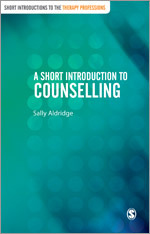A Short Introduction to Counselling
- Sally Aldridge - BACP
Counselling Skills | Counselling and Psychotherapy (General) | Professional Issues (General)
Are you thinking of embarking on professional counselling training and in need of a clear overview of the therapy profession? Well look no further! This down-to-earth guide will provide you with the ideal ‘way-in’ by explaining what it really means to become a professional counsellor – what is involved in training and real-life practice.
Sally Aldridge, Director of Registers at BACP, will take you step-by-step though what ‘counselling’ actually is; introducing its basic concepts, historical development, research base and structure of the profession. Demonstrating the far-reaching influence of counselling, the book will show you how its concepts have been applied beyond the consulting room and examine the recent place of counselling in the NHS and wider mental health care.
It takes considerable skill and years of experience to write such a detailed, yet accessible introduction to the exciting, complex and dynamic profession of counselling and psychotherapy.
Sally Aldridge has produced something remarkable here; this is a text which delivers insightful discussion on the development, nature and scope of counselling in a clear, compelling and accessible fashion.
This book gives an impressive, comprehensive introduction to the world of counselling [...] Aldridge's passion for counselling - 'the best job there is' - enthuses new practitioners, as well as giving a compact overview of the field for those in practice. Trainers could adopt some of the ideas for activities. Additionally research findings are skilfully intertwined, making this a useful starting point for therapists undertaking research. Overall the book will appeal to those with professional curiosity, as there is a wealth of authoritative information within its pages, gained from Aldridge's varied career and her years working for BACP.
The topics of training, research, ethics and career development, in particular, are handled in an in-depth, comprehensive and insightful manner. The exercises provided at the end of each chapter can serve to challenge students of counselling and help them develop critical thinking skills. The research studies presented in every chapter enhance the credibility of what has been written. The examples presented throughout the book not only make reading interesting, but can help the student identify with and understand more clearly what has been presented.
Useful background reading fior anyone working in human services, not just counselling per se.
Helpful as an additional text for those considering the counsellor training journey.
There is always room for clear introductions to counselling - up to date and comprehensive
A really good easy to read book which outlines all that is needed to know in the early stages of counselling training.
An easy to read, accessible book. It is well laid out and structured, covering a good range of topics.





